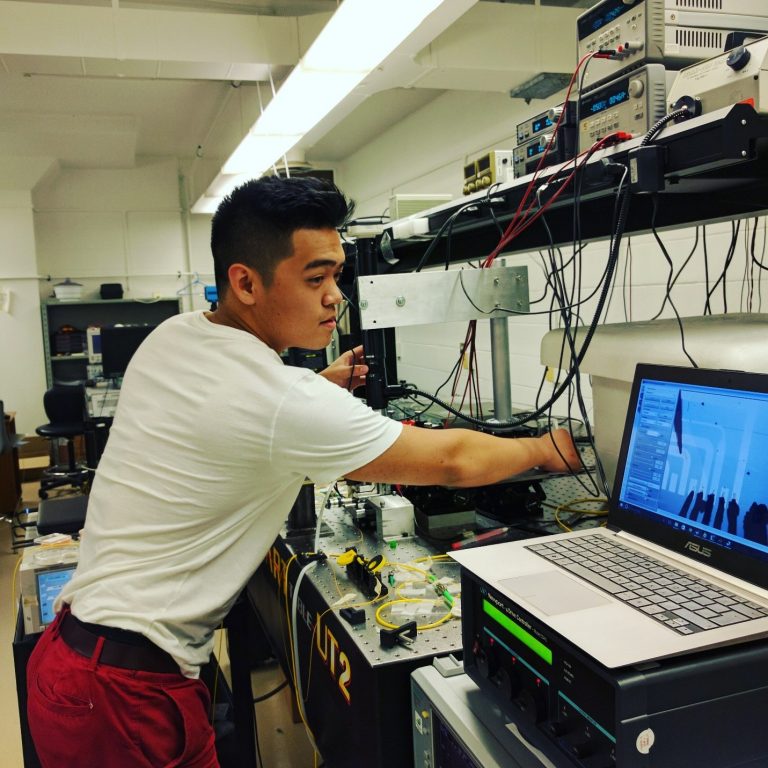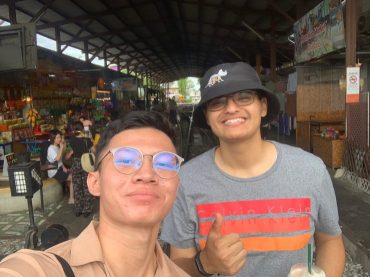For up-to-date information on the various ESROP programs, please refer to the Engineering Science website. You will also receive emails about ESROP from Don Newton, Curriculum and Research Officer, in the fall.
Overview
The Engineering Science Research Opportunities Program, or ESROP, is a unique program designed to give EngScis the chance to participate in cutting edge research early in their academic careers. Through ESROP, EngScis can conduct research at the University of Toronto or at renowned research facilities abroad. It is incredibly rare for a program to offer research opportunities at this scale for first- and second-year students. An ESROP research opportunity takes place during the summer after first, second, or third year. All you need is ambition and a passion for learning new things!
Why Research?

Upper-year EngScis have spoken with Professor Arthur Chan, Associate Chair, Year 3 & 4 for the Division of Engineering Science. These were some of their takeaways about the value of research in Engineering Science.
Regardless of whether you intend to enter industry or research after graduation, there are some very tangible benefits to working in a lab during a summer, both academically and career-wise.
First, by the very nature of a lab environment, you will be constantly learning. Often during research, you will be asked to simply read some papers, or improve your understanding of a subject. This is very unique. In typical student summer jobs, you will not be actively learning so much as working. You will also become an expert in one specific topic: the subject of your research.
Although research and industry are presented as two distinct paths after graduation, they actually have a lot of relevance to one another. Those with industry experience are valuable in a research setting, because they understand how innovation in a lab could be brought to market. In industry, those with research experience are perceived to be at the forefront of development in their field, and often as creatives or innovators. Research will distinguish you as a curious, passionate, or ambitious student who is excited about advancing your knowledge and abilities. Moreover, EngSci is all about being multidisciplinary! It’s worth working in industry before you decide to pursue a career in research, and it’s worth trying research before pursuing a career in industry. Between ESROP and PEY, you can easily get experience in both areas.
ESROP – U of T and ESROP – ExOp
ESROP – U of T and ESROP – ExOp (exceptional opportunities) are student-driven programs designed to support research opportunities for EngScis. To qualify for the programs, students in first and second year reach out to professors and researchers. Once students have found a research group that is keen to take them on for the summer, they can apply to either ESROP – U of T or ESROP – ExOp, depending on whether the research group is at U of T or elsewhere. Successful applicants will qualify for funding from EngSci throughout their summer of research. That is in addition to compensation provided by the lab.

Kyle Hsu, 1T9, hard at work in the Micro/Nanophotonics Research Lab. [Source]
ESROP – Global
ESROP – Global is for students who want to spend their summer at one of many international destinations that are partnered with the Engineering Science program. Successful applicants are sent to a global research institution at locations including Japan, Germany, Thailand, and Singapore! The goal of ESROP – Global is both to have students participate in cutting edge research at world-renowned institutions and to give them the opportunity to explore a new culture and get out of their comfort zones! Students have had fantastic travel and research experiences in the past, and having international perspectives is very valuable as an engineer. Here is one of our favorite travel excerpts from ESROP – Global students:
Marwan Ismail, EngSci 2T6 – King Mongkut’s University of Technology Thonburi

Marwan (right) and Dylan, a friend he met in Thailand
This summer, I was granted the opportunity to explore the wonderful country of Thailand. From the many grand Buddhist temple complexes to the famous train market and the beautiful beaches like Hua Hin, to the bustling downtown of central Bangkok, there is so much to see and so many unique people to meet, and our weekend trips helped me discover so much of it. I worked with a very diverse group of interns on the Innovative Cognitive Computing team in the Department of Computer Science at King Mongkut’s University of Technology Thonburi in Bangkok, and hearing their stories has been an eye-opening experience. I have met interns from Brunei, Singapore, Thailand, Indonesia, Afghanistan, Cambodia, and Burma as well as our diverse group of EngSci students from Poland, Egypt, Japan, and China, and I have seen how all of us have united in this one place with a collective interest in exploring computer science, data science, machine learning, and robotics. Our group office had a surreal view of the Bangkok skyline, and it was always positive and enjoyable to work in and having a ping-pong table made things that much more fun. Almost every day, I would meet someone new with a new story to tell, and learning about their life experiences and aspirations helped me reflect upon my own and understand how unique we really are.
I learned so much about Thai culture and language, particularly their collective adherence to Buddhism and the specificity of their tones in their language. Changing the tone ending of a word drastically changes it meaning, so you must be careful not to confuse “fried chicken” with “chicken sucking”. Furthermore, while around 90% of the country is Buddhist, and the state religion is Buddhism, a significant minority of the country is also Muslim, with around 5%, or 4 million people practicing the faith. Being Muslim myself, having easy access to Halal Thai food made my experience of their cuisine very enjoyable. Some of their common dishes include a wide variety of curries, basil chicken and rice, beef curry noodles, pad Thai, a (very) spicy papaya salad, pad see ew, and many more. My favourite amongst them has to be their numerous noodle dishes. Access to mosques helped me in meeting new people, and I learned a bit about how the Muslim community thrives in Thailand. So, if you want to explore your academic interests early while visiting a completely new country and meeting unique people, then ESROP is an excellent way of pursuing it.
More About ESROP
To read more about previous ESROP students’ experiences and stories, check out the link here.
